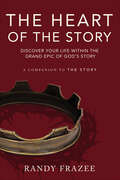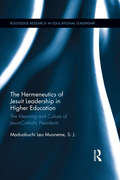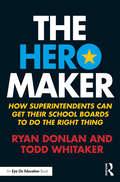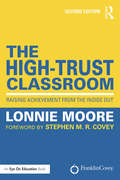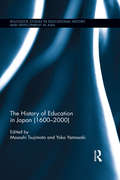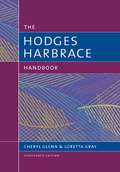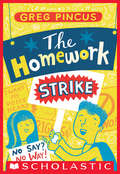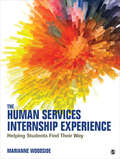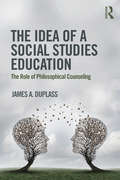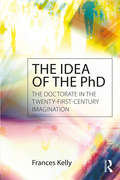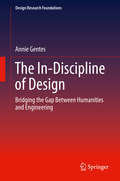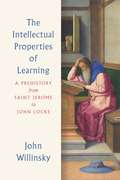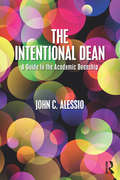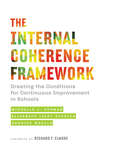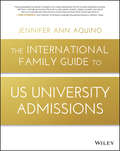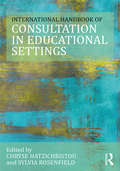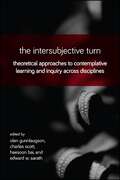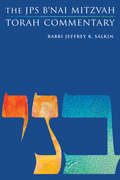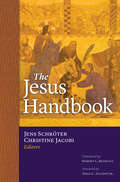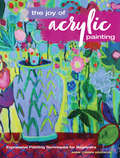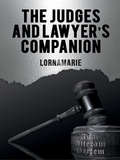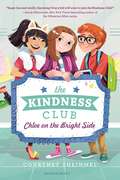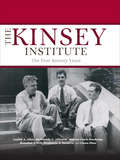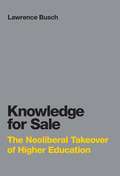- Table View
- List View
The Heart of the Story: Discover Your Life Within the Grand Epic of God's Story (The\story Ser.)
by Randy FrazeeThe Heart of the Story will help you see God&’s Word in a new and inspiring light. In the Bible&’s seemingly disconnected stories, you&’ll discover one grand, unfolding epic – God&’s story from Genesis onward – and your own life-story contained within it.&“To understand the Bible,&” says author and pastor Randy Frazee, &“you need bifocal lenses, because two perspectives are involved. The Lower Story, our story, is actually many stories of men and women interacting with God in the daily course of life. The Upper Story is God&’s story, the tale of his great, overarching purpose that fits all the individual stories together like panels in one unified mural.&” In this new edition, Randy dives deeper in the Upper and Lower stories and shows how both perspectives will open your eyes to the richness and relevance of the Bible. Illuminating God&’s master-plan from Genesis to our daily lives, The Heart of the Story will encourage you to experience the joy that comes from aligning your stories with God&’s.
The Hermeneutics of Jesuit Leadership in Higher Education: The Meaning and Culture of Catholic-Jesuit Presidents (Routledge Research in Educational Leadership)
by Maduabuchi Muoneme, S.J.With a focus on seven Jesuit university leaders emeriti and the late University of Notre Dame President Father Theodore Hesburgh, this book offers a critical analysis of the common values, philosophies, and leadership practices of Jesuit-Catholic university presidents within the broader higher education context. Looking at the impact of these leaders’ spirituality on their leadership styles, The Hermeneutics of Jesuit Leadership illuminates the influence of their common perspectives and leadership styles on university policy and culture. Offering a clear framework for Jesuit-Catholic organizational culture in higher education, the author explores the key lessons and practices that can be derived from the presidents’ similar leadership ideals and qualities.
The Hero Maker: How Superintendents Can Get their School Boards to Do the Right Thing
by Todd Whitaker Ryan DonlanLearn how to turn your school board members into heroes by helping them make smart, worthwhile decisions that they will deserve to brag about. In this much-needed book, Ryan Donlan and Todd Whitaker offer practical strategies to help superintendents develop better working relationships with their boards. You’ll discover how to: reconnect board members to the real purpose of education, despite their agendas work with your board more effectively during meetings and at times in between guide board members into more productive roles when they overreach beyond policymaking connect and communicate with board members regardless of personality encourage board members to play to their strengths start each school year undefeated and know when it is time to move on. Each chapter contains hero-making tips to help you get started. The book also includes a special feature on board personalities and the Process Communication Model® (PCM), a method that will make it easier to avoid miscommunication with board members. With this practical book, you'll be able to overcome the challenges of the superintendent–board relationship so that your board can make better decisions for those who matter most—the students.
The High-Trust Classroom: Raising Achievement from the Inside Out
by Lonnie MooreCreate a classroom environment where students trust their teacher—and one another! In the second edition of this bestseller, co-published by Routledge and Franklin Covey, you’ll learn how to establish the 25 qualities of the high-trust classroom. All change begins with self-awareness, and this book will help you identify the things that you can do personally and professionally to build trust and engage the learner. You’ll learn how to: Manage your emotions to promote a calm, safe, and welcoming classroom environment; Plan effective lessons by setting measurable goals for your students and helping them achieve to their fullest potential; Communicate clearly with your students to build trust and convey expectations with a positive attitude; Become an inspirational and motivating figure in your students’ lives; And much, much more! This updated edition includes a new section on scoreboarding – visually tracking daily or weekly progress to help drive personal and professional growth – as well as a section on getting students to take ownership of their learning. Whether you are a new or veteran teacher, this book will help you develop a personal growth plan to create a classroom in which all students feel valued, motivated, and inspired.
The History of Education in Japan (Routledge Studies in Educational History and Development in Asia)
by Masashi Tsujimoto Yoko YamasakiAs one of the most rapid and earliest nations to achieve "Western modernisation", much of Japan’s success stems from its fruitful literacy history during the Tokugawa shogunate as well as later influences from Western educational ideals and consequent economic and democratic conflicts in Japan. This book seeks to enlighten readers on how education and schooling contributed to Japan’s particular process of modernisation and industrialisation. These historical insights can be applied to crises in formal and systemised education today, and form the basis of potential solutions to controversies faced by formal education in Japan and other nation-states. A book that bridges the international information gap in Japan’s history of education will be immensely valuable to historians of both international and Japanese education.
The Hodges Harbrace Handbook (19th Edition)
by Cheryl Glenn Loretta GrayImprove your writing skills with THE HODGES HARBRACE HANDBOOK, 19th Edition! Learn how to write effectively, choose the best information, arrange it well, and use the most appropriate language when writing for a particular audience. This grammar-first handbook provides complete coverage of writing essentials to help you develop the skills you need to be a successful college writer, including grammar, style, punctuation, mechanics, writing, and research.
The Homework Strike
by Greg PincusGregory K., overwhelmed by homework, decides to make a stand -- but the stand takes on momentum of its own and Gregory has to live with the consequences.Gregory K. has too much homework.Middle school is hard work, and Gregory tries to be a good student. He participates in class, he studies for his tests -- he and his friends even help each other with their assignments. But no matter what he does, there's never enough time to finish all his homework. It just isn't fair.So Gregory goes on a total, complete homework strike. No worksheets, no essays, no projects. His friends think he's crazy. His parents are worried about his grades. And his principal just wants him to stop making trouble. Can Gregory rally his fellow students, make his voice heard, and still pass seventh grade?Find out in this book for anyone who thinks school is stressful, gets headaches from homework, or just wants to be heard.
The Human Services Internship Experience: Helping Students Find Their Way
by Marianne R. Woodside"This text is the ‘bread and butter’ for interns who seek to work in human service fields." -Fred Hall, Mississippi College The Human Services Internship Experience: Helping Students Find Their Way aims to help students in field-based courses bridge theory and practice during their internships. The goal is to show students how to apply their academic work in a real-world setting and to confirm and expand their identity as human service professionals. To meet this goal, Marianne Woodside assists students in developing that identity, learn to work within an agency setting, learn to use supervision effectively, and to be aware of multicultural and ethical perspectives in human service delivery and supervision as well as develop the appropriate knowledge, skills, and values to effectively perform the multiple roles of the human service professional. Students will learn how to successfully conclude the internship and transition from intern to employee.
The Human Services Internship Experience: Helping Students Find Their Way
by Marianne R. Woodside"This text is the ‘bread and butter’ for interns who seek to work in human service fields." -Fred Hall, Mississippi College The Human Services Internship Experience: Helping Students Find Their Way aims to help students in field-based courses bridge theory and practice during their internships. The goal is to show students how to apply their academic work in a real-world setting and to confirm and expand their identity as human service professionals. To meet this goal, Marianne Woodside assists students in developing that identity, learn to work within an agency setting, learn to use supervision effectively, and to be aware of multicultural and ethical perspectives in human service delivery and supervision as well as develop the appropriate knowledge, skills, and values to effectively perform the multiple roles of the human service professional. Students will learn how to successfully conclude the internship and transition from intern to employee.
The Idea of a Social Studies Education: The Role of Philosophical Counseling
by James A. DuplassOffering a fresh take on the purpose of social studies today, James A. Duplass positions philosophical counseling as a way for teachers to engage students in thinking deeply about what it means to be a citizen in a democratic society. The Idea of a Social Studies Education takes a uniquely humanistic approach to the idea of a social studies education to show how teachers can act as philosophical counselors in preparing students for active civic engagement. Duplass reminds the reader of the needs of students in modern society who seek to develop an identity worth living and the role social studies can play in students achieving that process. By focusing on the cultivation of students’ autonomy, authenticity, efficacy, and agency, Duplass’ approach avoids political biases and instead encourages critical thinking to decipher what a democratic ideology truly is.
The Idea of the PhD: The doctorate in the twenty-first-century imagination
by Frances Jennifer KellyThe Idea of the PhD: The doctorate in the twenty-first-century imagination analyses the PhD as it is articulated in diverse areas of contemporary discourse at a time in which the degree is undergoing growth, change and scrutiny worldwide. It considers not just institutional ideas of the PhD, but those of the broader cultural and social domain as well as asking whether, and to what extent, the idea of the Doctor of Philosophy, the highest achievable university award, is being reimagined in the twenty-first century. In a world where the PhD is undergoing significant radical change, and where inside universities, doctoral enrolments are continually climbing, as the demand for more graduates with high-level research skills increases, this book asks the following questions: How do we understand how the PhD is currently imagined and conceptualised in the wider domain? Where will we find ideas about the PhD, from its purpose, to the nature of research work undertaken and the kinds of pedagogies engaged, to the researchers who undertake it and are shaped by it? International in scope, this is a text that explores the culturally inflected representation of the doctorate and its graduates in the imagination, literature and media. The Idea of the PhD contributes to the research literature in the field of doctoral education and higher education. As such, this will be a fascinating text for researchers, postgraduates and academics interested in the idea of the university.
The In-Discipline of Design
by Annie GentesDesign is a conceptive activity which is usually presented as a sensible, sequential process and action. This book claims that design cannot be reduced to the rational, effective planning and organization that most models (such as design thinking) present. The author suggests another type of rationality which is based on what the humanities call aesthetics, writing, composition, and style: a rationality based in imaginary elaboration and coherence. The chapters, therefore, demonstrate that design practice is about creating not only functional tools, but planes of reflections that challenge norms. To support this claim, this book analyzes research programs, art works, and design projects that produced new information and communication technologies (ICT). This is detailed using examples in each chapter. From these examples, two types of conclusions are derived: a first level considers the lessons that we can draw from these examples in terms of design practice while the second level starts a theoretical discussion based on these analyses of use cases. The goal is to develop an understanding of conception in its different forms. This book brings the use of these neglected methods to the foreground as a way to explicate the design process. Taking into consideration the humanities within design contributes to the discussion on pluridisciplinarity. The book posits that design as a historical and situated activity is a truly multidisciplinary endeavor that bridges the gap between engineering sciences and the humanities.
The Intellectual Properties of Learning: A Prehistory from Saint Jerome to John Locke
by John WillinskyProviding a sweeping millennium-plus history of the learned book in the West, John Willinsky puts current debates over intellectual property into context, asking what it is about learning that helped to create the concept even as it gave the products of knowledge a different legal and economic standing than other sorts of property. Willinsky begins with Saint Jerome in the fifth century, then traces the evolution of reading, writing, and editing practices in monasteries, schools, universities, and among independent scholars through the medieval period and into the Renaissance. He delves into the influx of Islamic learning and the rediscovery of classical texts, the dissolution of the monasteries, and the founding of the Bodleian Library before finally arriving at John Locke, whose influential lobbying helped bring about the first copyright law, the Statute of Anne of 1710. Willinsky’s bravura tour through this history shows that learning gave rise to our idea of intellectual property while remaining distinct from, if not wholly uncompromised by, the commercial economy that this concept inspired, making it clear that today’s push for marketable intellectual property threatens the very nature of the quest for learning on which it rests.
The Intentional Dean: A Guide to the Academic Deanship
by John C. AlessioBased on faculty leadership and administrative experiences, The Intentional Dean explores the reasons to pursue a deanship and how to successfully attain a position as an academic dean. Additionally, this accessible guide provides understanding of key activities and responsibilities of the deanship, such as setting positive agendas, budgeting and budget reductions, merit pay determination, and effectively attending to disciplinary issues. Stressing bold action, support for curriculum diversity, and the importance of protecting due process, this book helps prospective and current deans take deliberate steps toward making a positive difference in the lives of students. Unique in the manner in which it defends both faculty rights and important administrative prerogatives, The Intentional Dean effectively demonstrates how deans can play a key role in bettering their college, the university, and the communities they serve.
The Internal Coherence Framework: Creating the Conditions for Continuous Improvement in Schools
by Michelle L. Forman Elizabeth Leisy Stosich Candice BocalaThe Internal Coherence Framework presents a system of research-based practices for assessing and developing the conditions that support adult and student learning in schools. Internal coherence is defined as the ability of educators in a school or system to connect and align resources to carry out an improvement strategy, engage in collective learning, and use that learning to provide students with richer educational opportunities. The internal coherence framework featured in the book brings together three important domains of research: leadership for learning, organizational improvement, and instructional efficacy. School or system leaders who progress through this book with colleagues will develop a shared vision for ambitious teaching and learning anchored in the instructional core; organize the work of the leadership and teacher teams to advance this vision; and build psychologically safe team, school, and system cultures to support the risk taking and constructive challenges necessary to move schools or systems to the next level of performance. At the heart of the book is a survey and rubric that can help schools better understand their strengths and weaknesses and the kinds of resources they need to support student learning. The book blends theory and practice to bring tested wisdom to bear on critical issues of education leadership and professional learning.
The International Family Guide to US University Admissions
by Jennifer Ann AquinoExpert guidance for international families and students applying for admission to US universities Written by an experienced international educator and counselor, The International Family Guide to US University Admissions is an indispensable resource for the vast and increasing number of students applying for places at US Universities each year. Beginning with an introduction that explains to both students and parents how the book works and why, it offers milestones that must be completed during said application time period, a tried-and-true handbook that corresponds with each chapter, pop-outs that provide expert insight and resources that you should utilize throughout the process. Every year, hundreds of thousands of international students and their families must go through the painstaking, complicated, confusing and culturally baffling process that is US university admissions. Until now, there has been no single resource for readers to turn to for holistic, accurate and up-to-date advice on the subject. Following the timeline of the US university admissions cycle, the book guides the parents and the student through the entire process in order to ensure that they are pacing themselves appropriately – from preparation to submission and through to applying for student visas. It serves as an advisor throughout the process, providing insightful advice by parents and students that are relevant to specific milestones. With the help of this book, you'll discover how to make sense of the US admissions system – from start to finish. Understand the application and evaluation process in depth in order to be an informed and successful applicant Make your schooling selection from over 3,000 US universities by understanding what would make a good fit for the student Learn what is expected of you in writing essays, why it is important, and how to create beautiful, genuine writing pieces reflective of your outlook in life Enjoy case studies and words of advice from the author's former students and their families Understand the difference between the SAT and ACT exams Whether you're an international student living outside of the US or an ex-pat living abroad, you'll find answers to all of your questions – all in one place.
The International Handbook of Consultation in Educational Settings (Consultation, Supervision, and Professional Learning in School Psychology Series)
by Sylvia Rosenfield Chryse HatzichristouThe rapid changes in the composition of school-age youth around the world have catalyzed a growing concern about how to address children’s mental health and education. Grounded in this increasingly global perspective, The International Handbook of Consultation in Educational Settings is designed to provide a multicultural/transnational approach to consultation theory, research, training, and practice in educational settings. With chapters written by geographically diverse and prominent scholars across the field of school psychology, this handbook captures the range of ways in which consultation services are trained, implemented, and researched internationally. Written for practitioners, researchers, faculty members, and graduate students in the fields of school psychology, school counseling, special education, and educational psychology, this volume is the first of its kind to provide a comprehensive look at consultation in learning environments across the world. The International Handbook of Consultation in Educational Settings offers various perspectives on models, implementation, training, and research on school consultation. After an introduction to the volume by the editors, contributors to Part II examine school-based consultation around the world to explore how consultation services are implemented in different countries. Part III addresses cross-cultural issues in consultation, particularly at a systems level. Part IV presents themes related to processes and issues in the implementation of consultation by focusing on approaches in various countries. The chapters in Part V focus on consultation training, offering insights into the development of students and professionals into effective consultants in cross-cultural and systemic contexts. Part VI describes how practitioners can contribute to the body of research on consultation through careful planning and implementation of their work. Finally, the editors summarize key concepts and findings in a concluding chapter.
The Intersubjective Turn: Theoretical Approaches to Contemplative Learning and Inquiry across Disciplines
by Olen Gunnlaugson; Charles Scott; Heesoon Bai; Edward W. SarathA first of its kind, this book maps out current academic approaches in higher education to second-person contemplative education, which addresses contemplative experience from an intersubjective perspective. Until recently, contemplative studies has emphasized a predominantly first-person standpoint, but the expansion and embrace of second-person methods provides a distinctive learning context in which collective wisdom and shared learning can begin to emerge from dialogue among students and groups in the classroom. The contributors to this volume, leading researchers and practitioners from a variety of institutions and departments, examine the theoretical and philosophical foundations of second-person contemplative approaches to instruction, pedagogy, and curricula across various scholarly disciplines.
The JPS B'nai Mitzvah Torah Commentary: The Jps B'nai Mitzvah Torah Commentary (JPS Study Bible)
by Rabbi Jeffrey K. SalkinFor too many Jewish young people, bar/bat mitzvah has been the beginning of the end of their Jewish journeys. When students perceive the Torah as incomprehensible or irrelevant, many form the false impression that Judaism has nothing to say to them. Enter the game-changer: the JPS B’nai Mitzvah Torah Commentary shows teens in their own language how Torah addresses the issues in their world. The conversational tone is inviting and dignified, concise and substantial, direct and informative. The narrative summaries, “big” ideas, model divrei Torah, haftarot commentaries, and discussion questions will engage teens in studying the Torah and haftarot, in writing divrei Torah, and in continuing to learn Torah throughout their lives—making it the book every rabbi, cantor, parent, and tutor will also want to have. Jewish learning—for young people and adults—will never be the same.
The Jesus Handbook
by Edited by Jens Schröter and Christine JacobiAn authoritative collection of first-rate scholarship on Jesus, his world, the outcomes of his life, and the quest to locate him in history. The Jesus Handbook is an indispensable reference work featuring essays from a team of renowned international scholars on the significance and meaning of the life of Jesus of Nazareth. Rooted in historical-critical methodology, it emphasizes a diversity of perspectives and provides a spectrum of possible interpretations rather than a single unified portrait of Jesus. The Handbook&’s dozens of authors—Jewish, Roman Catholic, and Protestant—each remain committed to the principle of interpreting the life of Jesus in context, while also giving due diligence to the implications of archaeological evidence and recent discourses in the hermeneutics of history. After an introduction that lays out the considerations of the task at hand, the authors survey the history of Jesus research and take a close look at the historical material itself—textual and otherwise. From this foundation, the Handbook then details the life of Jesus before at last exploring the reception and effects of Jesus&’s life after his death, especially in the first centuries CE. With this wealth of information available in a single volume, scholars and students of the New Testament and early Christianity—and anyone interested in the search for the historical Jesus—will find The Jesus Handbook to be a resource that they return to time and again for both its breadth and depth.Contributors:Sven-Olav Back, Knut Backhaus, Reinhard von Bendemann, Albrecht Beutel, Darrell L. Bock, Martina Böhm, Cilliers Breytenbach, James G. Crossley, Lutz Doering, Martin Ebner, Craig Evans, Jörg Frey, Yair Furstenberg, Christine Gerber, Katharina Heyden, Friedrich Wilhelm Horn, Stephen Hultgren, Christine Jacobi, Jeremiah J. Johnston, Thomas Kazen, Chris Keith, John S. Kloppenborg, Bernd Kollmann, Michael Labahn, Hermut Löhr, Tobias Nicklas, Markus Öhler, Martin Ohst, Karl-Heinrich Ostmeyer, James Carleton Paget, Rachel Schär, Eckart David Schmidt, Daniel R. Schwartz, Markus Tiwald, David du Toit, Joseph Verheyden, Samuel Vollenweider, Ulrich Volp, Annette Weissenrieder, Michael Wolter, Jürgen K. Zangenberg, Christiane Zimmermann, and Ruben Zimmermann.
The Joy of Acrylic Painting: Expressive Painting Techniques for Beginners
by Annie GonzalesNow is the time to pursue creative fulfillment! Annie O'Brien Gonzales felt a passion for art from an early age. But not until 30 years later--after raising a family and working "a real job"--did she get serious about painting. Along the way, she experienced the pleasures and the pitfalls of learning to paint. In these pages, she channels it all to help others discover (or re-discover) The Joy of Acrylic Painting. This guide offers an engaging, streamlined approach for any beginner, but especially those who--due to life detours or lack of time--had previously postponed their artistic aspirations. In a fun, instantly gratifying style, Gonzales combines the forgiveness of acrylics with the approachability of expressive painting. With special emphasis on the elements of color, pattern and texture, these lessons give you a jump-start on painting with feeling. If now is your time to pursue creative fulfillment, then this is the book to ease your way.Strategies for gathering resonant ideas and inspirationPractical advice, such as when to splurge and where to save on painting suppliesMixed-media techniques for creating character in your paintingsInspiration from Expressionist masters, including ways to use their work as a jumping-off point for your own original paintingsPLUS 8 fabulous start-to-finish painting projects--landscapes, still life, figures and abstracts
The Judges and Lawyer’s Companion
by LornaMarieThe Judges and Lawyer’s Companion’ is a must have and useful tool in the hands of Judges and Lawyers and in deed any one delivering a decision making role formally and informally. This book aims to reduce the valuable time lawyers at the bar and judicial officers on the bench spend looking for the meaning of Latin maxims. Law students seeking quick interpretation and dictionary meaning of Latin maxims will also benefit immensely. I have decided to compile this companion as a reference guide at a glance and I hope this piece of work will find its place on the book shelf of every Judge and Lawyer around the world. The author has carefully illustrated the meaning of each maxim using case authorities wherever possible in court ruling around the world. This book is a linguistic treasure, a robust companion with engaging collection puts revered proverbs at reader’s fingertips. An entertaining volume with a scholarly twist ready to inform, advise, and delight both casual leader and those who appreciate the art of language and the pleasure that lies beneath a rich collection of words, phrases, and expression. The joy of having this maxims companion consists of enabling a better understanding of the law in all its facets, in all ramifications on the aspects upon which they touch.
The Kindness Club: Chloe on the Bright Side
by Courtney SheinmelRejected by the cool girls' club, fifth-grader Chloe Silver, new in town after her parents' divorce, forms a different type of club, with offbeat Lucy Tanaka and nerdy Theo Barnes, that tests out different acts of kindness on classmates.
The Kinsey Institute: The First Seventy Years (Well House Bks.)
by Judith A. Allen Andrew Clark-Huckstep Brandon J. Hill Hallimeda E. Allinson Liana Zhou Stephanie A. SandersAn in-depth history of Alfred Kinsey&’s groundbreaking Institute for Sex Research and the cultural awakening it inspired in America—&“it has no rival&” (Angus McLaren). While teaching a course on Marriage and Family at Indiana University, biologist Alfred Kinsey noticed a surprising dearth of scientific literature on human sexuality. He immediately began conducting his own research into this important yet neglected field of inquiry, and in 1947, founded the Institute for Sex Research as a firewall against those who opposed his work on moral grounds. His frank and dispassionate research shocked America with the hidden truths of our own sex lives, and his two groundbreaking reports —Sexual Behavior in the Human Male (1948) and Sexual Behavior in the Human Female (1953)—both became New York Times bestsellers. In The Kinsey Institute: The First Seventy Years, Judith A. Allen and her coauthors provide an in-depth history of Kinsey&’s groundbreaking work and explore how the Institute has continued to make an impact on our culture. Covering the early years of the Institute through the &“Sexual Revolution,&” into the AIDS pandemic of the Reagan era, and on into the &“internet hook-up&” culture of today, the book illuminates the Institute&’s enduring importance to society.
The Knowledge for Sale: The Neoliberal Takeover of Higher Education
by Lawrence BuschA new philosophy of higher education has taken hold in institutions around the world. Its supporters disavow the pursuit of knowledge for its own sake and argue that the only knowledge worth pursuing is that with more or less immediate market value. Every other kind of learning is downgraded, its budget cut. In Knowledge for Sale, Lawrence Busch challenges this market-driven approach.The rationale for the current thinking, Busch explains, comes from neoliberal economics, which calls for reorganizing society around the needs of the market. The market-influenced changes to higher education include shifting the cost of education from the state to the individual, turning education from a public good to a private good subject to consumer demand; redefining higher education as a search for the highest-paying job; and turning scholarly research into a competition based on metrics including number of citations and value of grants. Students, administrators, and scholars have begun to think of themselves as economic actors rather than seekers of knowledge.Arguing for active resistance to this takeover, Busch urges us to burst the neoliberal bubble, to imagine a future not dictated by the market, a future in which there is a more educated citizenry and in which the old dichotomies -- market and state, nature and culture, and equality and liberty -- break down. In this future, universities value learning and not training, scholarship grapples with society's most pressing problems rather than quick fixes for corporate interests, and democracy is enriched by its educated and engaged citizens.
